The Indonesian government recently announced its plans to provide increased incentives for locally-produced battery electric vehicles (BEVs) with high levels of local content, known as TKDN. Minister of Investment and Downstreaming, Rosan Roeslani, confirmed the introduction of a progressive incentive system that will prioritize locally-made BEVs with a higher content of local parts and materials. This move aims to encourage the growth of the electric vehicle industry in Indonesia by supporting domestic manufacturing.
This decision comes in light of South Korea’s LG Group withdrawing from a consortium aimed at establishing an EV battery materials supply chain in Indonesia due to weaker than expected global demand for BEVs. However, Indonesia remains committed to boosting its BEV production capabilities, with the recent launch of the country’s first domestically branded BEV, the Polytron G3.
To support the government’s ambitious BEV production targets, a robust BEV ecosystem is essential, including strong supply chains and charging stations. Minister Roeslani emphasized the need for a capable BEV ecosystem to drive the industry forward. In order to accelerate the deployment of BEV charging networks across the country, the government has revised regulations to allow third-party companies to invest in charging infrastructure, aside from the PLN national electricity company.
In addition to the government’s initiatives, industry players are invited to participate in the Just Auto Excellence Awards, a prestigious program that celebrates innovation, leadership, and impact in the automotive industry. Nominations are now open for companies to showcase their achievements and gain global recognition for their contributions to the industry. This is a valuable opportunity for businesses to highlight their advancements and be recognized among the best in the automotive sector.
Overall, Indonesia’s focus on boosting local BEV production, enhancing the BEV ecosystem, and recognizing industry excellence through awards demonstrates the country’s commitment to becoming a key player in the global electric vehicle market. With continued support and investment, Indonesia is poised to emerge as a competitive hub for electric vehicle manufacturing and innovation.







